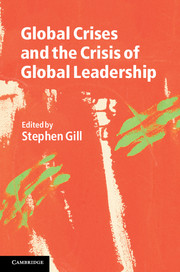Book contents
- Frontmatter
- Contents
- Contributors
- Acronyms
- Acknowledgements
- Introduction: global crises and the crisis of global leadership
- Part I Concepts of Global Leadership and Dominant Strategies
- Part II Changing Material Conditions of Existence and Global Leadership: Energy, Climate Change and Water
- 4 The crisis of petro-market civilization: the past as prologue?
- 5 Global climate change, human security and the future of democracy
- 6 The emerging global freshwater crisis and the privatization of global leadership
- Part III Global Leadership Ethics, Crises and Subaltern Forces
- Part IV Prospects for Alternative Forms of Global Leadership
- Glossary
- Bibliography
- Index
5 - Global climate change, human security and the future of democracy
from Part II - Changing Material Conditions of Existence and Global Leadership: Energy, Climate Change and Water
Published online by Cambridge University Press: 05 June 2012
- Frontmatter
- Contents
- Contributors
- Acronyms
- Acknowledgements
- Introduction: global crises and the crisis of global leadership
- Part I Concepts of Global Leadership and Dominant Strategies
- Part II Changing Material Conditions of Existence and Global Leadership: Energy, Climate Change and Water
- 4 The crisis of petro-market civilization: the past as prologue?
- 5 Global climate change, human security and the future of democracy
- 6 The emerging global freshwater crisis and the privatization of global leadership
- Part III Global Leadership Ethics, Crises and Subaltern Forces
- Part IV Prospects for Alternative Forms of Global Leadership
- Glossary
- Bibliography
- Index
Summary
Summary
This chapter focuses on climate change, a key part of the global crisis that exemplifies failures of global leadership. It explores the implications of climate change for democracy and human security. The context for the argument is that the current global crisis poses unprecedented challenges because of its severity and multidimensional character, as well as the absence of either an ideological consensus or effective hegemonic management of global policy formulation and implementation. Global history during the last several centuries has been dominated by Eurocentricism, short-term security and political economy challenges, and violent geopolitics that caused devastation and massive suffering but did not undermine fundamental world order structures.
This comparatively simple framework is being increasingly drawn into question. The real new world order has substantially eroded Eurocentric dominance of the policy agenda, the emergence of global warming as potential catastrophic threat has underlined the importance of long-range planning and investment, and the intensifying contradictions of neoliberal forms of capitalism appear to be generating a systemic crisis of adjustment, although market forces and government leaders are focused on viewing the current deep world recession as cyclical and thus to be corrected by restoring normalcy. Even if this cyclical interpretation seems convincing in the period immediately ahead, it will soon have to acknowledge the increasing displacement of neoliberal modes of production and investment by various forms of state capitalism, as epitomized by China. Also problematic in an original manner is the extent to which the economistic preoccupations of leaders with the woes of profit-seeking businesses and financial entities and anguished workers has made it almost impossible to give appropriate parallel attention to the multiple effects of the growing ecological challenges associated with climate change, growing water scarcities and the prospects of peak oil. Beyond this, it is already evident that the most marginal and vulnerable peoples are destined to have their present ordeals ignored and, in all likelihood, to be subject to disproportionately great harms and burdens in the future.
- Type
- Chapter
- Information
- Global Crises and the Crisis of Global Leadership , pp. 89 - 106Publisher: Cambridge University PressPrint publication year: 2011
- 1
- Cited by



